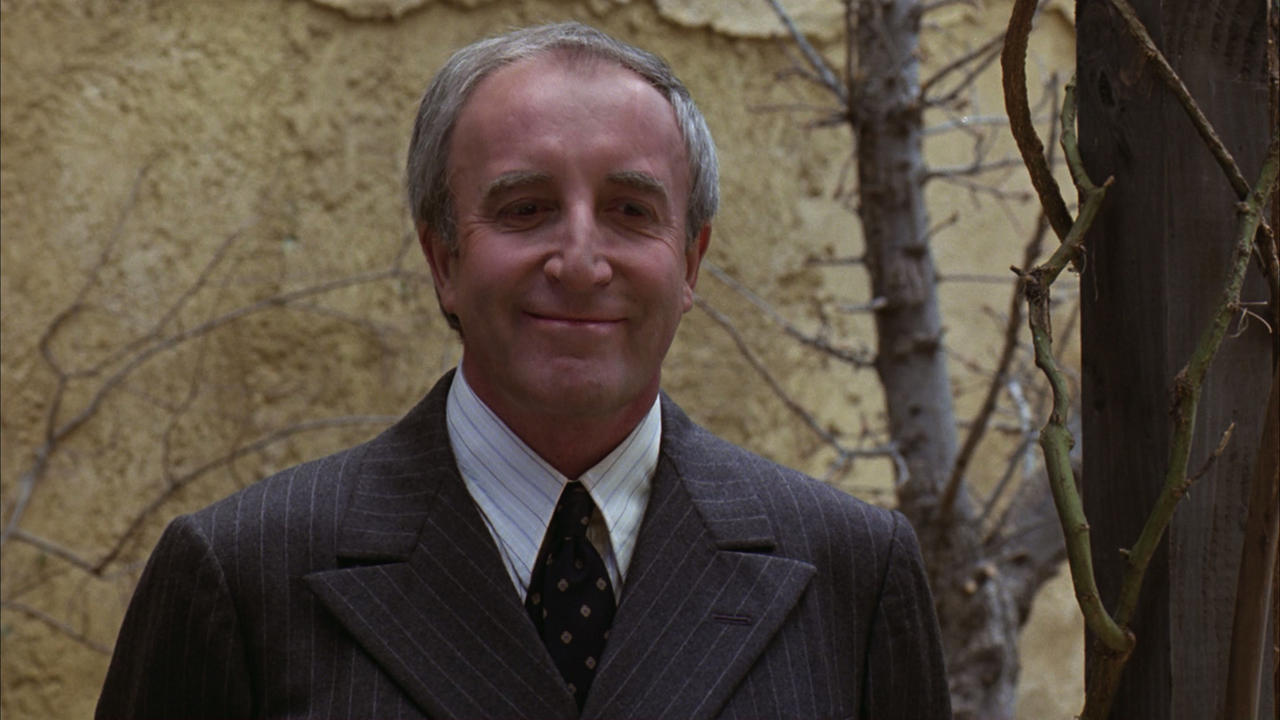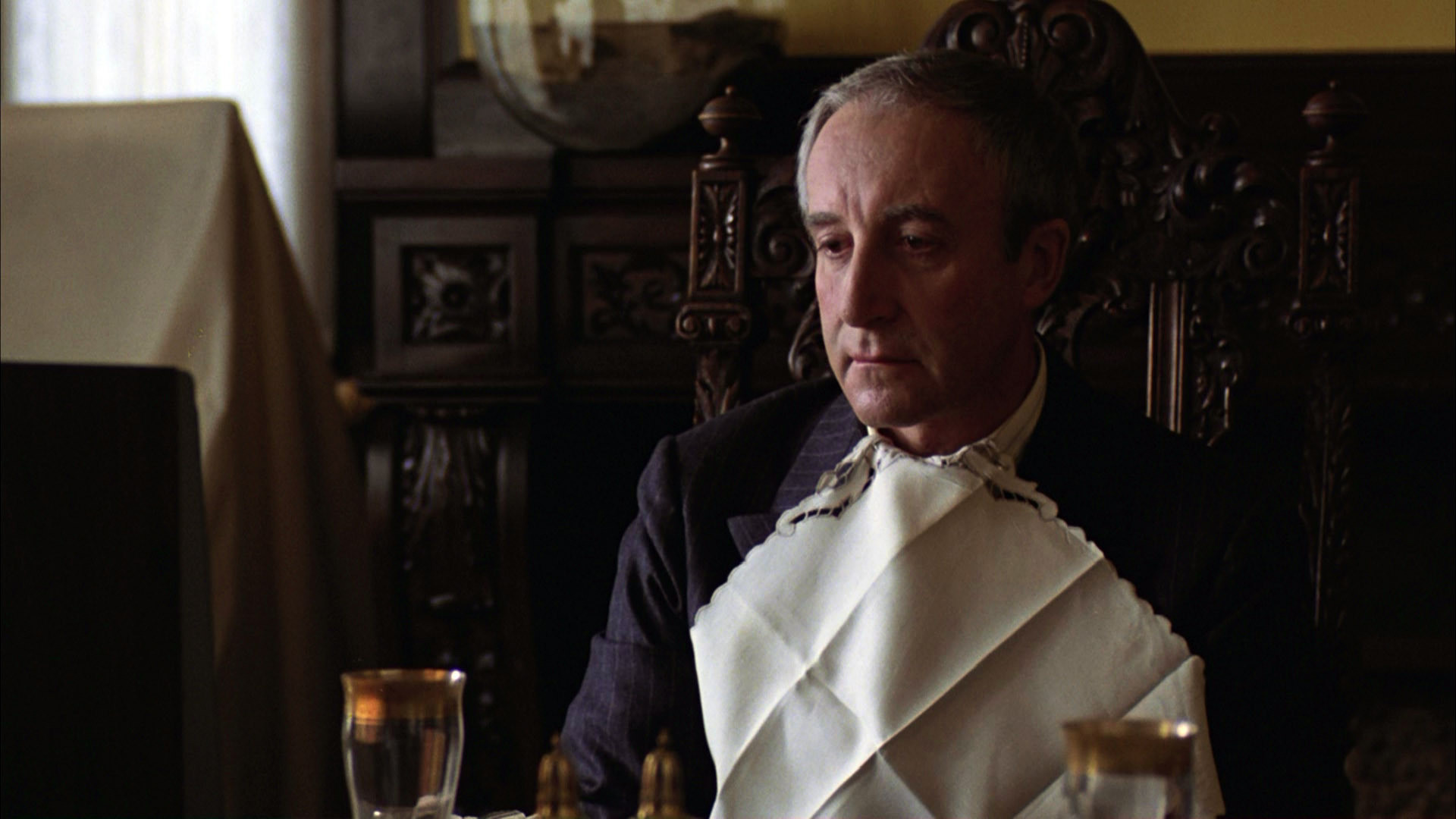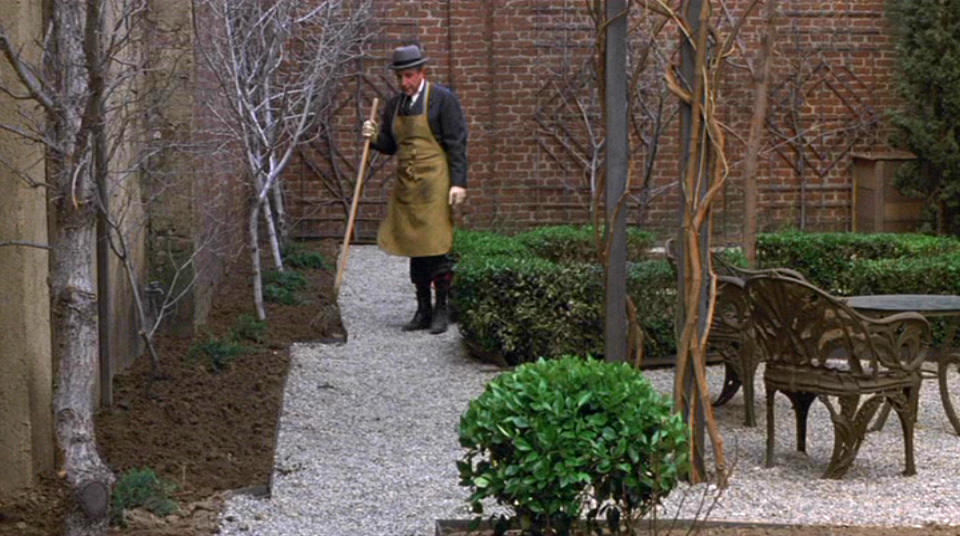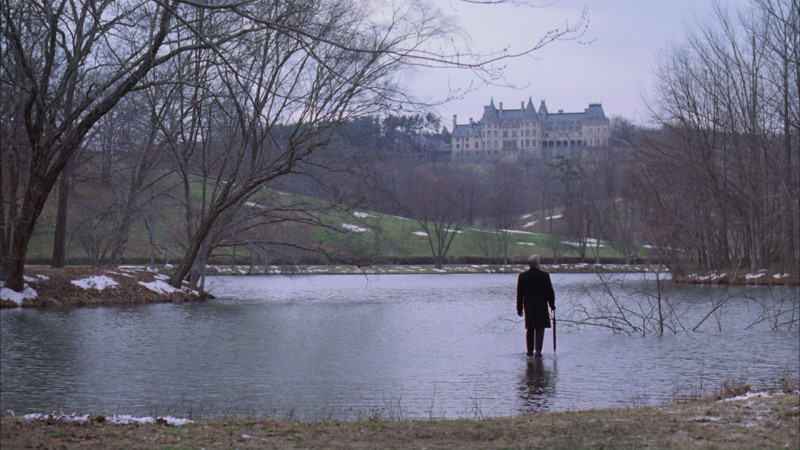
Take a chance on me
Peter Sellers’ sans pareil performance – also his penultimate – as Chance, the gardener, idiot savant exemplar, is a disarmingly taciturn portrait, and the discerning centerpiece of Hal Ashby’s oft omitted masterpiece from 1979, Being There.
Ashby directed several seminal pictures throughout the 1970s, including such substantial works as Harold and Maude (1971), The Last Detail (1973), Shampoo (1975), and Coming Home (1978) but his furtive social satire, Being There, may just be the one with the most persistence, relevancy, and tenacity.
Sellers spent some eight odd years goading author Jerzy Kosiński (The Painted Bird) to grant him the privilege to adapt his novel Being There and to portray the confused and misconceived standard-bearer at its crux.
While it is countenance to suggest that Sellers’ most recognized and rewarding role(s) may have been in Stanley Kubrick’s Dr. Strangelove: Or How I Learned to Stop Worrying and Love the Bomb (1964) or perhaps his gut-busting turn as the inept police detective Inspector Jacques Clouseau in Blake Edwards’ The Pink Panther series of films, it’s certainly Sellers’ about-face as Chance in Being There that was his treasured and most edifying achievement.
“Hal Ashby directs Being There at an unruffled, elegant pace, the better to let Mr. Sellers’s double-edged mannerisms make their full impression upon the audience. Mr. Sellers never strikes a false note, as he exhibits the kind of naïveté that the film’s other characters mistake for eccentricity. Not knowing polite conventions, he answers even perfunctory questions (‘Will you be seated?’) with hilariously excessive enthusiasm (‘Yes, I will!’). Not knowing figures of speech, he begins standing like a stork when a doctor advises him to keep his weight off one foot. Not knowing the answers to certain questions, he simply doesn’t answer them. This impresses his new friends as reticence of the cagiest kind.”
– Janet Maslin, New York Times
The unbearable lightness of being

With an autumnal vein siphoning a melancholic cruor, Ashby’s film takes the life of an even-tempered fable about Chance – and truly, no one but Sellers could play this role with such single-mindedness and savvy – a forsaken, illiterate, near shut-in, a totally sheltered simpleton and leitmotif à la mode for the social order.
A middle-aged gardener, Chance has spent his life in the walled-in estate of an aberrant millionaire named Jennings (who may or may not be Chance’s father, though this is never made clear). Here Chance has been well cared for; dressed in custom-tailored suits, groomed and fed by the estate’s cook, Louise (a brilliant Ruth Attaway), wholly sheltered from the outside world, subsisting in part on a solid TV-watching regiment and hemmed in practice as an actual gardener.
As Being There begins it is revealed that Jennings has passed away and Chance is evicted from the estate by attorneys, now thrust into the real world, he is left to wander pell-mell the streets of Washington, DC, his wheel of fortune spiralling just so. In his chic upscale threads, armed only with a TV remote control – which he hilariously uses in an attempt to turn off an aggressive urban street gang – Chance somehow chisels and finagles his way to celebrity.
Unwittingly struck by a limo owned by one Eve Rand (Shirley MacLaine, in fine form), he somehow finds himself in one outlandish scenario after another when he is escorted back to Rand’s well-heeled estate to be examined by her husband’s personal doctor.
Eve’s husband is an ailing industrialist, Benjamin Rand (a marvellous Melvyn Douglas in a role that won him an Oscar for Best Supporting Actor), who, like everyone else in Chance’s orbit, finds himself smitten by this candid, soft-spoken, and strangely unorthodox man. Chance is a simpleton, to be sure, but his every nuance and gesture is never taken for face value by anyone, instead he is thought to be, repeatedly, a wise acre, all knowing, deeply contemplative, and of vast, not vacuous, intellect.
“[Being There] begins with a cockamamie notion, it’s basically one joke told for two hours, and it requires Peter Sellers to maintain an excruciatingly narrow tone of behaviour in a role that has him onscreen almost constantly. It’s a movie based on an idea, and all the conventional wisdom agrees that emotions, not ideas, are the best to make movies from. But Being There pulls off its long shot and is one of the most confoundingly provocative movies of the year.”
– Roger Ebert
The garden of earthly delights

In very little time Chance – now graciously ascribed as Chauncey Gardener – has become a welcomed guest and counsel in the Rand home. Benjamin in particular has found in Chauncey a high-minded and open-handed bestie, of sorts. Terminally ill, Benjamin starts to see the dim-witted pundit as anything but, as an equal, perhaps even as a chaperon for Eve, who is many years his junior.
Benjamin’s influence is greater than we first glean when the President of the United States, ‘Bobby’ (Jack Warden, genius), comes around for a visit. Similarly to the Rands, the president is stirred by Chauncey’s turn of phrase, finding his mutterings about groundskeeping to be a deeply penetrative insight on the human condition encoded in a lush metaphor (“Spring is the time for planting,” and other such banalities somehow strike the intelligentsia as freely profound).
So buoyed by the gardener’s statements, the president quotes him at a televised public address, causing a widespread free-for-all as the press and news media clamour to interview this strange new figure. In short order a Tonight Show style talk show presents Chance to the populace and appearances at insider parties, even a lucrative book deal, lands on his credulous lap.
When asked questions beyond his depth, which is most questions for Chance, he nods, usually with a blank slate expression before offering up limited statements like; “First comes spring and summer, but then we have fall and winter. And then we get spring and summer again.” That his deadpan pronouncements seem to be interpreted as a shrewd treatise on society at large is in turns laughable and lousy.
Like a Yogi Berra-style guru or Mark Twain-level humorist, Chance is suddenly an influential logician, despite being, as Louise – one of the only people who see Chance for what he is – puts it, “Short-changed by the Lord and dumb as a jackass.”
“Being There, in its own way, is a horror film, a testament to how easily the public can be fooled by a little window dressing and a few idiots with even the most basic understanding of life. It’s a testament to how far ahead in the game were Hal Ashby and writer Jerzy Kosinski (disappointingly, with his only screenplay credit) that the plot of Being There eventually got turned into a massive global hit, re-appropriated, SANS SATIRE, as Forrest Gump. How little we’ve learned.”
– Oliver Lyttelton, The Playlist
I like to watch

Much has been made of the final shot of Being There, which, like much of the film, can be open to numerous interpretations. Without getting into specifics let’s just say that the inspired sequence, while hinting at miraculous perception – and one that Ashby apparently dreamed up on the spot – is in keeping with the point at issue.
The literary origins of the story, which allows for many interpretations, and the messiah-like analogy of our main character, both greatly enhances the jeering, almost acerbic satire on display.
The suggestion that Chance’s journey may end in the Oval Office seems to presage Dubya’s disastrous two-term presidency, as well as enabling the far less astute and altogether bludgeoning Robert Zemeckis litany, Forrest Gump (1994). Where Tom Hanks’ titular turn as the guileless Gump inexplicably won him an Oscar – another of many lapses regularly made by the Academy of Motion Picture Arts and Sciences – Sellers’ far more nuanced and svelte display, reminiscent of the legendary Buster Keaton, was nominated but never won.
Since we’re here mocking the Academy for their many false moves, the film that robbed Being There of it’s many potential trophies was Robert Benton’s bland, movie-of-the-week courtroom snoozefest Kramer vs. Kramer. Benton’s film walked away with five Oscars, beating Being There in every major category. That it ended up being Sellers’ final role (a few posthumous releases notwithstanding) is all the more vexing considering it may well have been his greatest and most meaningful role.
Sellers’ health was in decline, and he suffered a series of heart attacks the following year, the last of which he did not recover from. It would have been comme il faut for Sellers to receive the Oscar (he did receive a Golden Globe, for what it’s worth), but at least he and Ashby got to see Being There make good, and maybe they even envisaged that they were ahead of the times as well. Satire is a subtle, seldom done, and delicious confection, that here is seethed to perfection and fully realized.
“My ambition in the cinema, since I came across it, was to play Chance the gardener in Being There. I have realized that ambition, and so I have no more.”
– Peter Sellers
Author Bio: Shane Scott-Travis is a film critic, screenwriter, comic book author/illustrator and cineaste. Currently residing in Vancouver, Canada, Shane can often be found at the cinema, the dog park, or off in a corner someplace, paraphrasing Groucho Marx. Follow Shane on Twitter @ShaneScottravis.